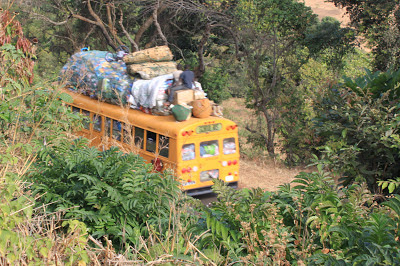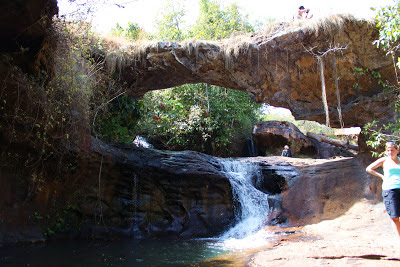I have just returned to the ship after a morning run, still
a little sweaty, although showered clean and ready to eat some breakfast. The
sun is hardly peeping through the clouds and although this means it is still so
early, it’s the way I like it. I’m not good at running and only go because my
friend asks and I know it’s good for me, but I do like to see the people and
the small part of the city around which we live, waking up for a new day.
This morning the streets were dark and the air was quiet
apart from a few cars on the road and the general noises of those already
walking the streets, some of which we were sure had never been to bed!
I wish I could describe everything that I see to you well
enough for you to understand. Perhaps if you’ve been to a third world country
before, you might taste what it is I am so often trying to describe. Even if
you haven’t, I hope you can imagine how it is and how it feels to be
here.
Yesterday was one of those days that deserved a lot of
describing words.
I went with a group of 7 other nurses and one translator to
a local hospital to see if we could do anything to help out or serve them.
After meeting with the Chief Surgeon, a couple of other surgeons and an
anaesthetist, we walked through the small hospital as they explained what we
saw; the laboratory, x-ray, paediatric clinic, labour room, one operating room,
a ward for vesico-vaginal fistula repairs, a pharmacy with few emergency
medications and the rest of the hospital in renovations, which included a
family planning clinic and consultations rooms. There was also a school with
350 children from 2 to 7 years old.
That morning and probably most others, they had no power. So
as we walked around we had to let our eyes adjust from dark hallways to rooms
lit with sunlight. What I noticed when I looked around was wear and tear of
chairs and benches which were constantly being sat on as people waited for
their turn to see the doctor, nicely painted walls, clean floors, a few spider
webs hanging from the ceiling, old, faded advertising of products and medicines
stuck to the wall here and there and apart from the people waiting, not much
else. The doctors had told us that they didn’t have much to work with and they
were certainly right.
I went with one of the local nurses who spoke English and
two fellow paeds nurses to the paediatric clinic to watch what was going on.
That day there were about five medical students, dressed in lab coats, there to
assess and practice, along with the one paediatrician and two nurses in scrubs,
sitting out of the way listening to music from their phones.
The local nurse explained the process to us. If you or your
child is sick, you can come to the hospital and pay a fee to get a ticket-
15,000GNF for an adult or 10,000GNF ($1.37 USD) for a child. This ticket lasts
one month and anytime within that month you can come back for more treatment
without paying another fee. The pretty faced local nurse told us that there
weren’t many patients right now because not many people had money because of
the political problems. (That is a whole new blog post issue!)
The patients that were lined up to be seen had the most common
complaint of diarrhoea. For some mothers the solution was to stop feeding their
new babies water and for others, to stop feeding their older babies cow’s milk
and formula and to begin giving them solids. Simple things like nutrition
teaching seemed to be lacking among the mothers. I have certainly found that an
issue among the mothers on the wards. Watching and hearing a baby be fed water,
sounds a lot like someone drowning and is not a very pleasant experience. The
motion they often use is cupping your hand on the side of the cheek, pouring a
small amount of water in and tipping the baby head down until the water is
gone, either by swallowing, spat out by crying or aspirated (breathed into the
lungs).
Somehow these mothers believe that all babies should be
given water from the time they are born, along with breast milk. They can also
be quite slow to begin solids for their babies, wondering why their child needs
more than just breast milk and water but not trying alternatives. These are
just a couple of things I have noticed over the years.
After standing in the cramped clinic room, with 10 others,
watching for a couple of hours, with nothing to drink, eat or lean on, one my
nurse friends just about fainted, but was saved just in time. After getting
some air, resting and recovering, we walked around the hospital to find the
rest of the group. They had been asked if they wanted to watch a surgical
removal of a uterine fibroid.
We were taken to the operating room, given a green surgical
hat to put on and entered a sparse room, complete with one empty cupboard, two
stainless steel trolleys, one power operated suction machine with no tubing,
one bucket on the floor, one surgical rubbish basin, one IV pole, one operating
table and one patient lying upon that bed. She was covered by a simple piece of
fabric, arm stretched out on the right side which had an IV and fluids running.
The windows in the room were open, lighting the room well with natural light,
but no power to run anything electrical, no oxygen and a few flies, flying
around the room sitting on anything they pleased.
The anaesthetist had one 5ml syringe and one needle, a vial
of diazepam, ketamine, atropine and ceftriaxone. We watched her as she smashed
open a pop vial (we use our fingers to gently pop the top off) with a giant
pair of forceps, seeing the glass splinter across the floor over the bucket. We
watched her as she diluted the IV diazepam by sticking the needle into the top
of the plastic IV bottle above the water line so the hole in the bag wouldn’t leak
and draw up the fluid she wanted. We watched her slow push the IV diazepam and
then when the surgeons were ready, she pushed the ketamine and atropine mixture.
We watched the patient begin to fall asleep, but before she was quite ready and
properly asleep, an oral airway (a large one) was introduced, causing
laryngospasm, in which she coughed and coughed. It wasn’t normal coughing, as
her body was mostly asleep. The veins in her neck bulged and her whole body
convulsed as she tried desperately to expel the large airway. It was held in
her mouth by the anaesthetist as she waited for her to stop coughing and
convulsing. There was no oxygen and no suction. There was no probe or machine
to measure her oxygen saturations and no paper present to write the condition
of the patient or the number of breaths she was taking between coughs as her
body struggled. She had a manual blood pressure cuff on her arm, but no
stethoscope in sight to listen to the blood pressure. Meanwhile the two
surgeons stood there waiting in their sterile gowns and gloves, unable to begin
until the patient was completely still.
We were there to observe, not to judge how they operated and
used their small amount of supplies, but my mind was screaming at me. My hands
sweated profusely as my anxiety for this patient wrapped around my heart until I
could stand it no more. I whispered to the nurse next to me that I had to leave
and so I walked out of that operating room. I handed my hat to another nurse,
relieved to know I wouldn’t watch that initial opening incision that could
potentially end her life. I walked out of the operating room entry way and
straight into a dark, dark hallway. I had to have air, I had to have light. I
somewhat stumbled towards the direction of light, feeling like the sunshine
could somehow dissolve the disaster of imaginings in my mind. I couldn’t stand
the harsh realities of what I had seen. I can’t bear to think that this surgery
was elective. Perhaps it would feel different if she had to be operated on or
she would die. But what I had seen looked more like a death sentence than an
improvement on life as she’d previously known it. But who I am to judge? I have
at my disposal in the hospital (mostly here and certainly at home) everything
we could ever medically need, in surplus. I have no idea how it feels to nurse
someone with nothing but the skills of my hand, the touch of my fingers, the
sight of my eyes and no back up. No machine to tell me exactly how my patient
is doing beyond what my eyes can see. And so we prayed. I sat on the chair I found
outside that operating room in the sunlight and we prayed. Our only defence,
but one I know can certainly save.



















